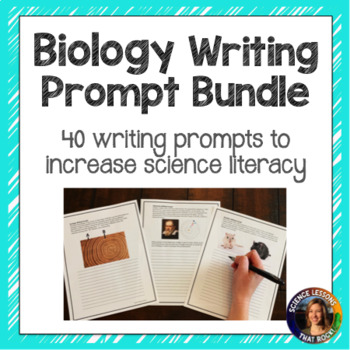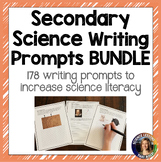Biology Writing Prompts Year Long Bundle
- Zip
- Google Apps™

What educators are saying
Products in this Bundle (4)
Also included in
- Want to improve your students' science literacy? Included are 178 secondary science writing prompts! Bundle and save! Why use writing prompts? All students need to improve their writing skills, especially english language learners. I created these writing prompts specifically for my ELL students. WPrice $77.60Original Price $97.00Save $19.40
Description
Want to improve your students' science literacy? Included are 40 biology writing prompts (both pdf and Google slide versions) that cover your year-long curriculum! Bundle and save! Topics include:
1. Scientific Method (throughout all units)
2. Characteristics of Life
3. Cell Size
4. Levels of Organization
5. Cell Structure and Function
6. Plant vs. Animal Cells
7. Stomata
8. Tonicity
9. Cellular Respiration
10. Mitosis
11. Mitochondria
12. Invasive Species
13. Food Webs
14. Population Growth
15. Dendrochronology
16. Bee Extinction
17. Animal Skull Inferences
18. Symbiosis
19. Succession
20. Biomes
21. Carbon Cycle
22. Inheritance
23. DNA
24. Meiosis- Crossing over
25. Blood Types
26. Gel Electrophoresis
27. Chromosomes
28. Colorblindness
29. Mutations
30. Cloning
31. Pedigree Charts
32. Nature of Science- Theory vs. Law
33. Survival of the Fittest
34. Natural Selection- peppered moth
35. Adaptations
36. Vestigial Structures
37. Homologous Structures
38. Selection Graphs
39. Speciation
40. Fossil Record
41. Cladograms
Why use writing prompts?
All students need to improve their writing skills, especially english language learners. I created these writing prompts specifically for my ELL students. Writing is typically one of the lowest scoring categories on the state language proficiency exam. To help them improve, I assigned a writing prompt for homework BEFORE the lesson was taught. The goal is for students to think and write about scientific phenomena. Having them answer the prompt before the lesson was taught allowed me to assess prior knowledge, address misconceptions, and guide my teaching.
You can also purchase these units individually:
You might also be interested in:
Science Writing Prompts FREE sampler
Secondary Science Writing Prompts MEGA BUNDLE
Be sure to follow my TpT store by clicking on the green "follow me" next to my seller picture to receive notifications of new products and upcoming sales.
Don't forget to leave feedback to earn TpT credits that can be used for future purchases!
Want free tips and resources sent to your inbox once a week? Subscribe to my newsletter! You can also...
♻️ Check out my blog
♻️ Follow me on facebook
♻️ Follow me on instagram
♻️ Follow me on pinterest



